Choosing the best conversational AI platform can feel overwhelming, but exploring novel and engaging methods offered by modern platforms can simplify your decision. Each conversational AI platform promises advanced features like natural language understanding, machine learning, and automatic speech recognition, making contact center automation a powerful tool to transform how businesses handle customer interactions. Navigating through the growing variety of conversational AI solutions can feel overwhelming with so many platforms vying for attention. The conversational AI landscape is rapidly evolving, offering diverse solutions for businesses to streamline their customer interactions.
In this article, we’ll explore 13 conversational AI solutions leading the market in 2025. These platforms empower businesses to create context-aware conversations, automate routine tasks, and improve user engagement. Whether you’re a developer seeking AI technology with coding expertise or a decision-maker looking for Smooth incorporation into existing workflows, this guide will help you make an informed choice.
Stay tuned as we dive into features, pricing, and use cases to help you pick the right conversational AI platform for your needs.
Key Considerations When Choosing a Conversational AI Platform
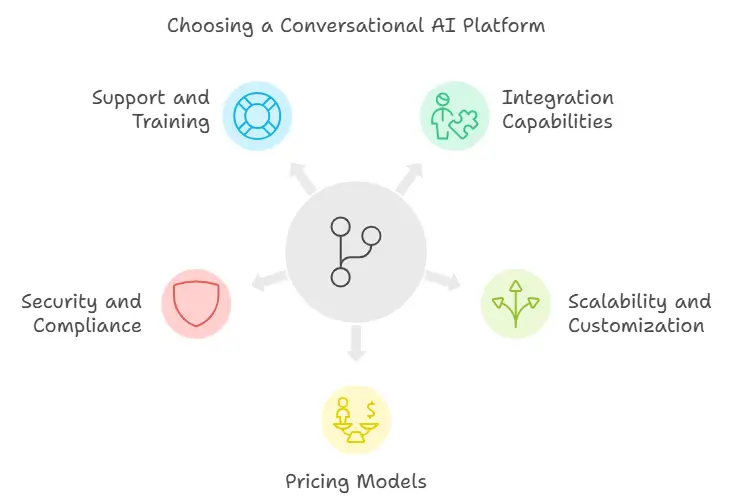
Finding the right conversational AI platform requires understanding the features that align with your business goals and how it leverages conversational data to enhance user interactions. A robust conversational AI solution will offer Flawless integration capabilities to build effective user friendly interface across multiple channels like chat, email, and voice assistants. Here are the critical factors to evaluate:
1. Integration Capabilities
A strong conversational AI platform should integrate effortlessly with your existing business processes. Look for platforms that offer Streamlined merging with CRMs, messaging platforms, and other software. This ensures smooth deployment without disrupting workflows. Many platforms offer seamless integration with CRMs, messaging apps, and other software, ensuring conversational AI chatbots function smoothly in existing workflows
2. Scalability and Customization
As your business grows, so do your requirements. Choose an AI platform that supports scalability and allows for customization. This flexibility ensures that your conversational AI software evolves alongside your organization, integrates seamlessly with your business logic to maintain operational efficiency and meeting unique needs over time.
3. Pricing Models
Evaluate the cost of ownership, including setup fees, subscription plans, and maintenance costs. Some platforms offer tiered pricing, making it easier for businesses to choose a plan that matches their budget.
4. Security and Compliance
With the increasing emphasis on process human language data, security and compliance are non-negotiable. Select platforms that prioritize data encryption, GDPR compliance, and privacy measures to safeguard sensitive customer interactions. Platforms powered by machine learning not only handle customer queries but also enhance security by identifying unusual patterns or potential threats.
5. Support and Training
The best platforms provide training materials, robust support, and even preloaded training templates to help businesses and developers get started. Ensure that the vendor offers ongoing support to optimize the response quality and functionality of your virtual agents.
These considerations will help you identify a comprehensive conversational Artificial Intelligence platform that fits your business needs.
Top 13 Conversational AI Platforms in 2024
Here’s a breakdown of the best conversational AI platforms that excel in different use cases, from improving user engagement to automating routine tasks.
1. Microsoft Azure Bot Service
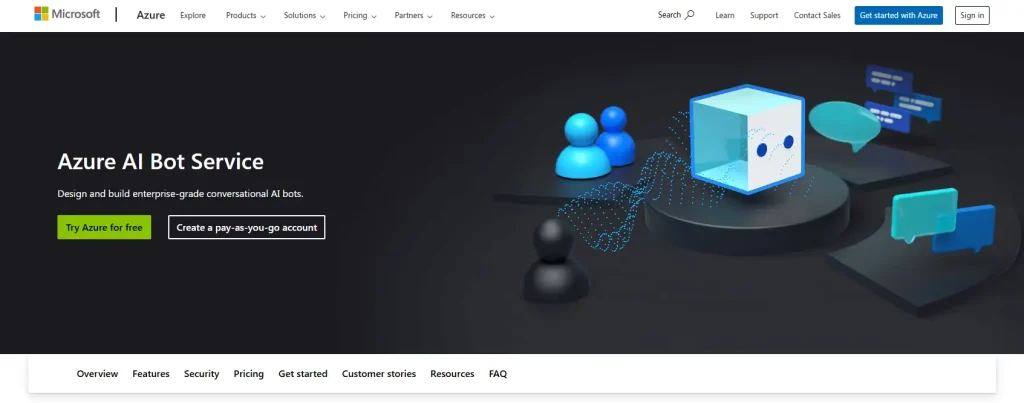
- Overview: Azure Bot Service is a powerful AI platform for building intelligent bots. It combines natural language processing and machine learning to deliver quick and effortless solutions.
- Key Features:
- Seamless integration with Microsoft tools like Teams and Dynamics.
- Supports advanced contextual understanding for human-computer interaction.
- Offers preloaded training templates for quick setup.
- Best For: Enterprises looking for a solution that integrates with existing Microsoft products.
2. Google Dialogflow
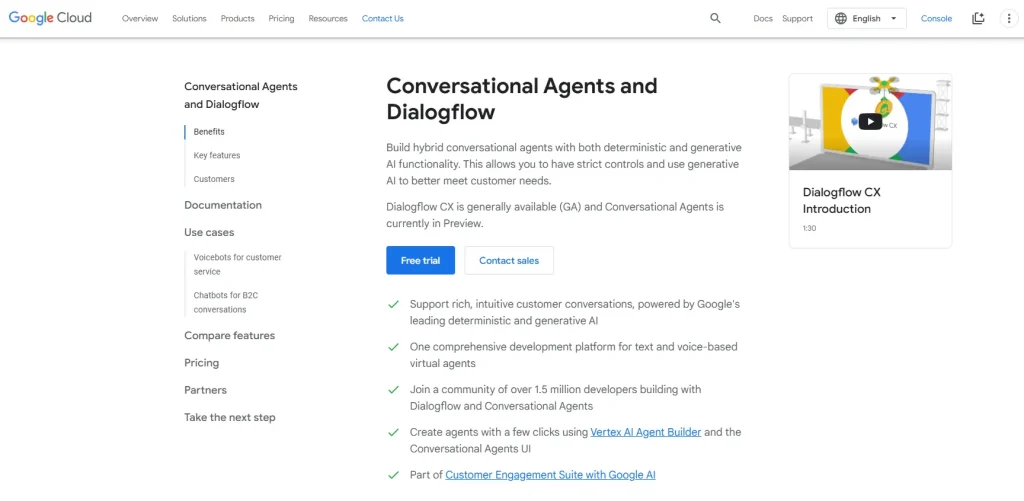
- Overview: Dialogflow uses Google’s cutting-edge AI technology to create User-friendly chat systems for websites, apps, and devices.
- Key Features:
- Supports natural language understanding and user intent matching confirmation.
- Delivers personalized customer interactions using AI-driven user input analysis.
- Easily integrates with Google Cloud.
- Best For: Businesses seeking a robust, cloud-based solution with global reach.
3. IBM Watson Assistant
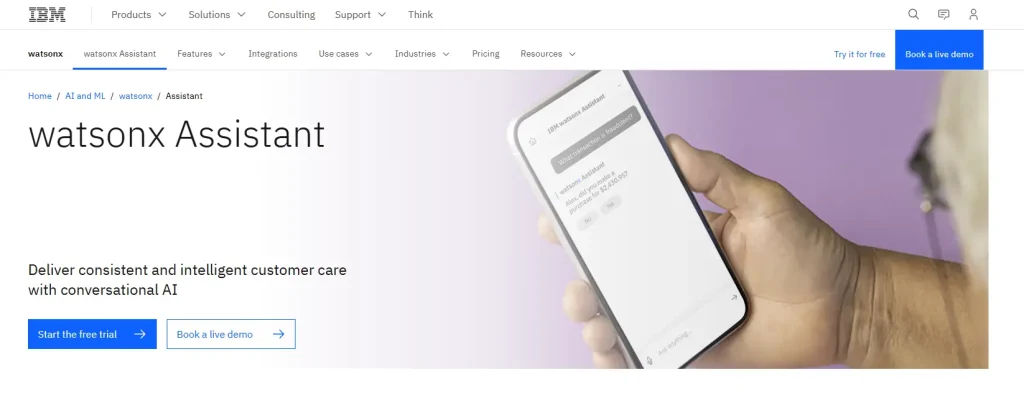
- Overview: IBM Watson Assistant offers powerful natural language conversations and conversational ai excels in handling complex scenarios.
- Key Features:
- Conversational AI technology with advanced virtual assistant capabilities.
- Allows human agents to take over when needed, ensuring smooth user interactions.
- Highly customizable with enterprise-grade security.
- Best For: Large enterprises that need AI for high-volume customer support and critical business processes.
4. Amazon Lex
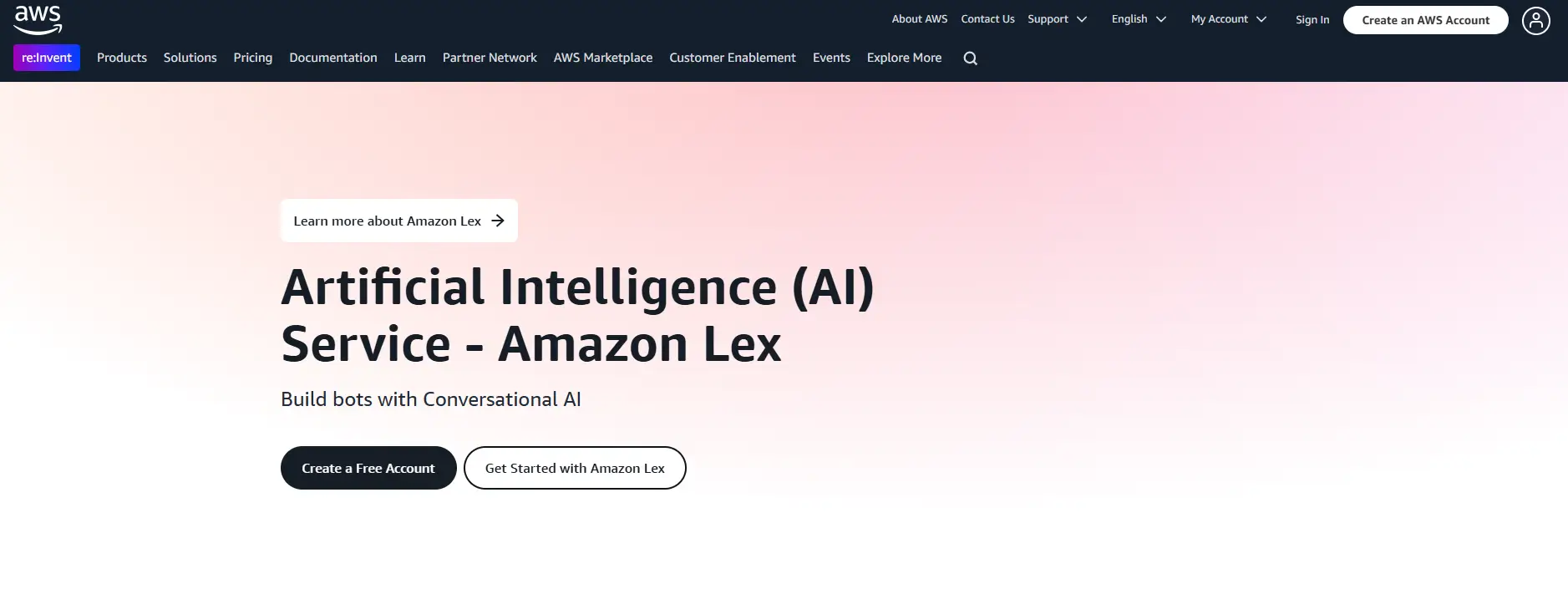
- Overview: Amazon Lex is designed to build applications with intuitive conversational interfaces using natural language understanding platform tools.
- Key Features:
- Combines auto speech recognition with natural language generation.
- Scalable solution with integration into AWS tools.
- Supports routine tasks automation for increased operational efficiency.
- Best For: Companies already leveraging AWS for their infrastructure.
5. Kore.ai
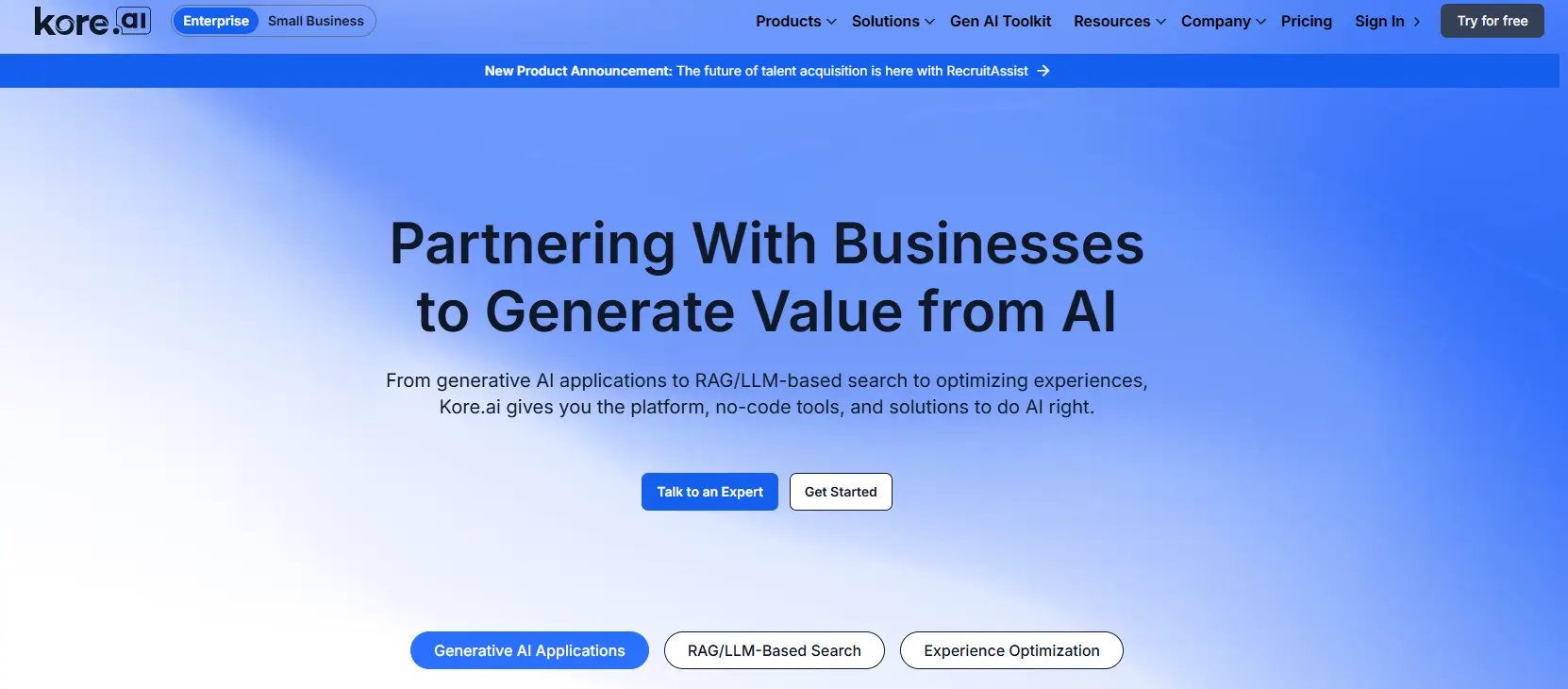
- Overview: Kore.ai delivers comprehensive conversational AI platforms tailored for industries like healthcare, retail, and finance.
- Key Features:
- Industry-specific solutions with advanced virtual agents.
- Conversational AI chatbots that enhance customer and employee experiences.
- Optimized for customer engagement and self-service.
- Best For: Industry-focused automation with high customization options.
6. SAP Conversational AI
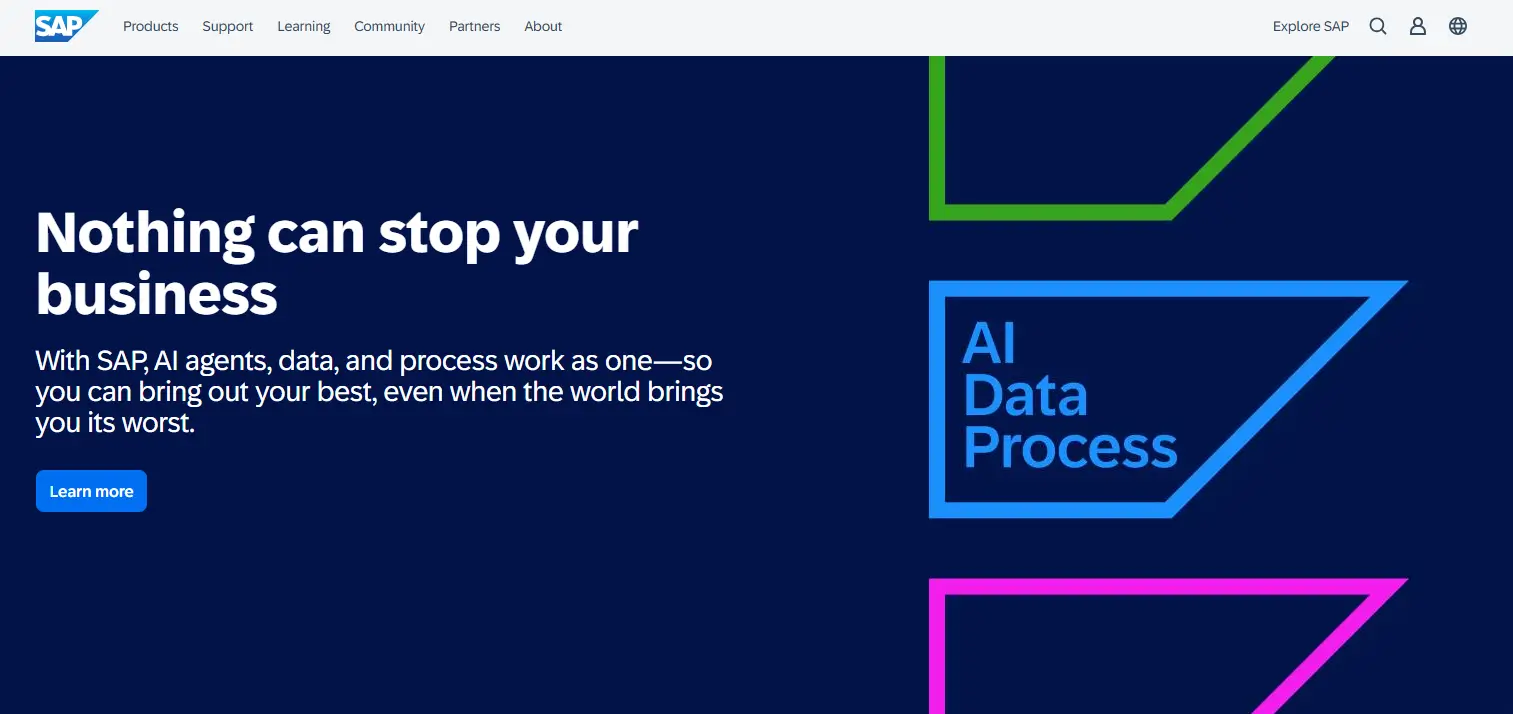
- Overview: SAP Conversational AI integrates deeply with SAP products, enabling customer service operations.
- Key Features:
- Interactive conversational interface for bot creation.
- Supports multilingual customer interactions.
- Ideal for contact center automation.
- Best For: Companies using SAP solutions and looking for seamless bot integration.
7. Tars
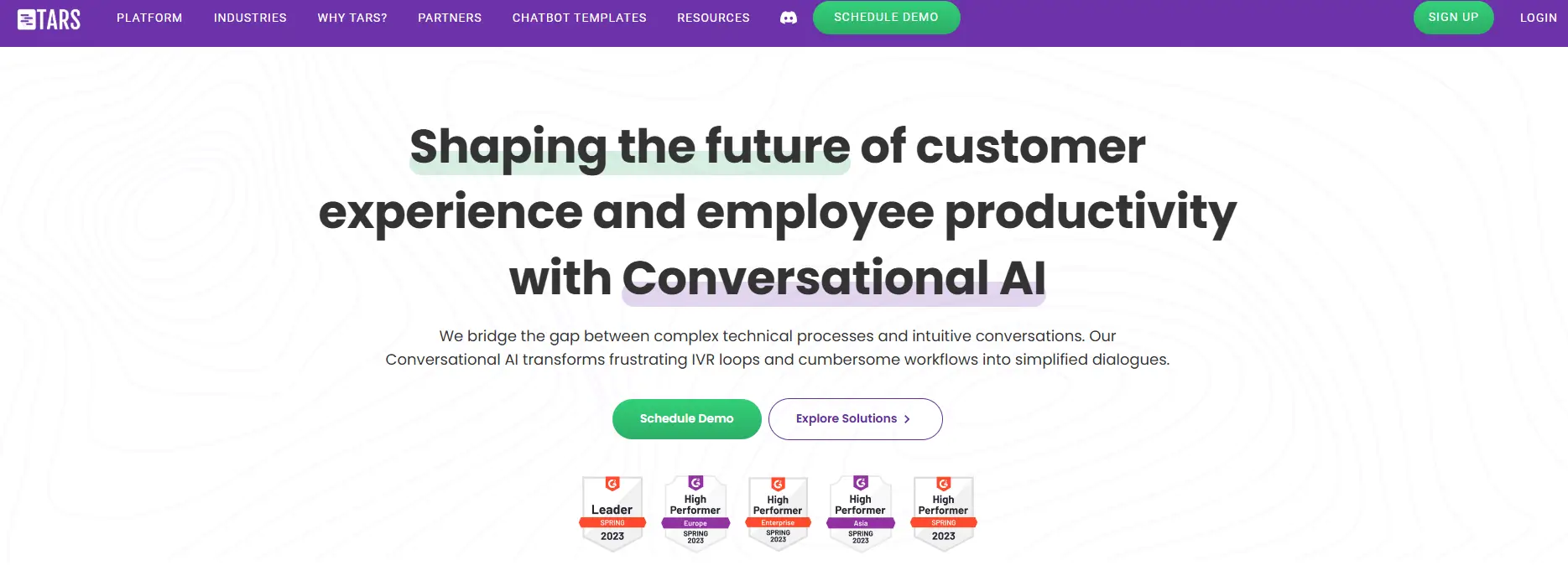
- Overview: Tars specializes in building intuitive conversational experiences that improve lead conversion rates.
- Key Features:
- Customizable conversational AI chatbots for lead generation.
- Minimal Development knowledge required for setup.
- Optimized for sales and marketing strategies.
- Best For: Small businesses and marketing teams.
8. LivePerson
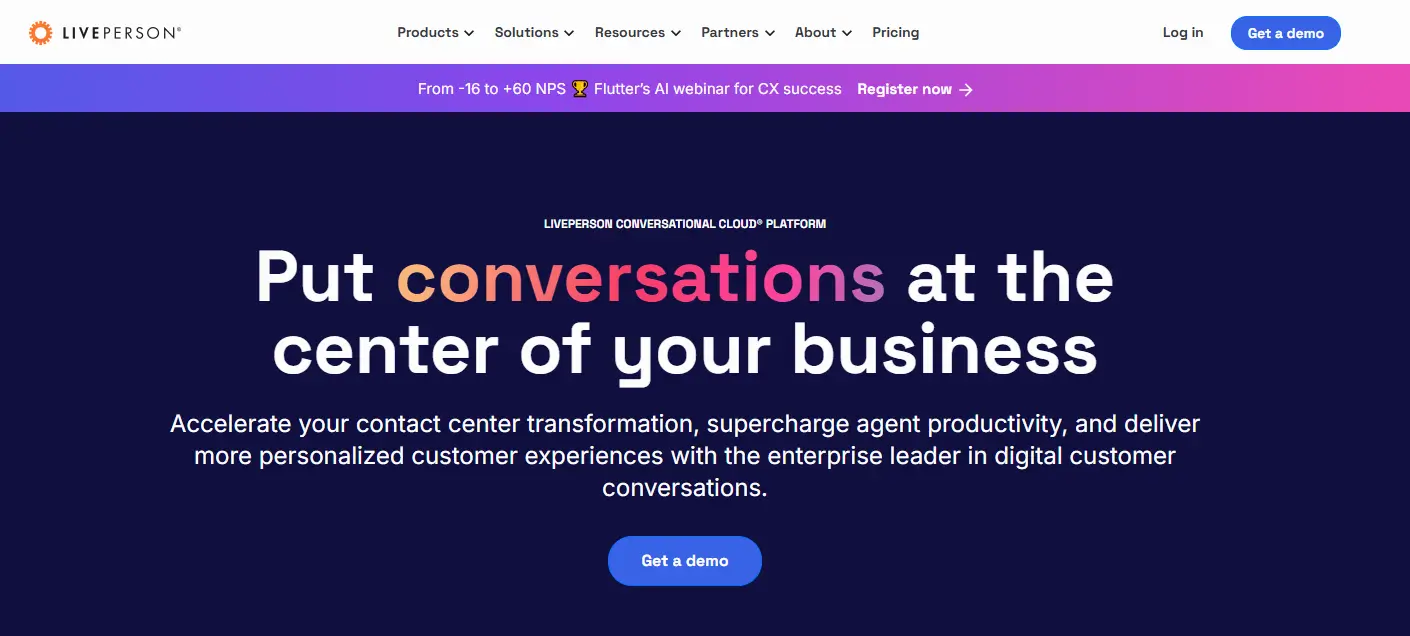
- Overview: LivePerson focuses on blending AI and human agents to deliver superior customer support.
- Key Features:
- Advanced human language processing.
- Integrates monitoring user feedback to refine responses.
- Helps with personalized responses in real-time.
- Best For: Businesses looking to improve enhanced customer experiences with hybrid AI-human solutions.
9. Ada
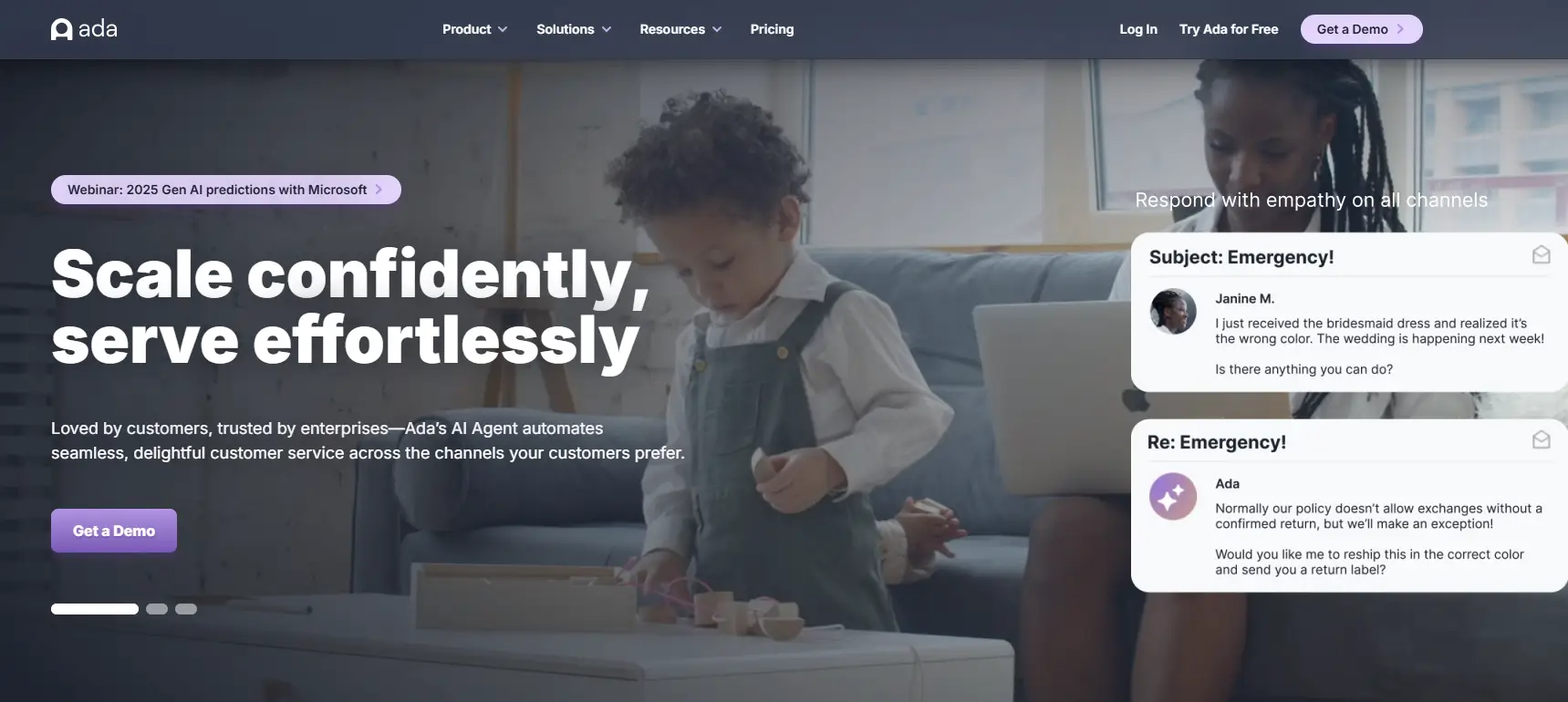
- Overview: Ada offers an AI-powered virtual assistant platform designed to streamline customer queries.
- Key Features:
- Handles complex conversations with ease.
- Boosts customer satisfaction through quick resolutions.
- Strong focus on response quality and analytics.
- Best For: Companies aiming to automate customer support while maintaining personalization.
10. Rasa
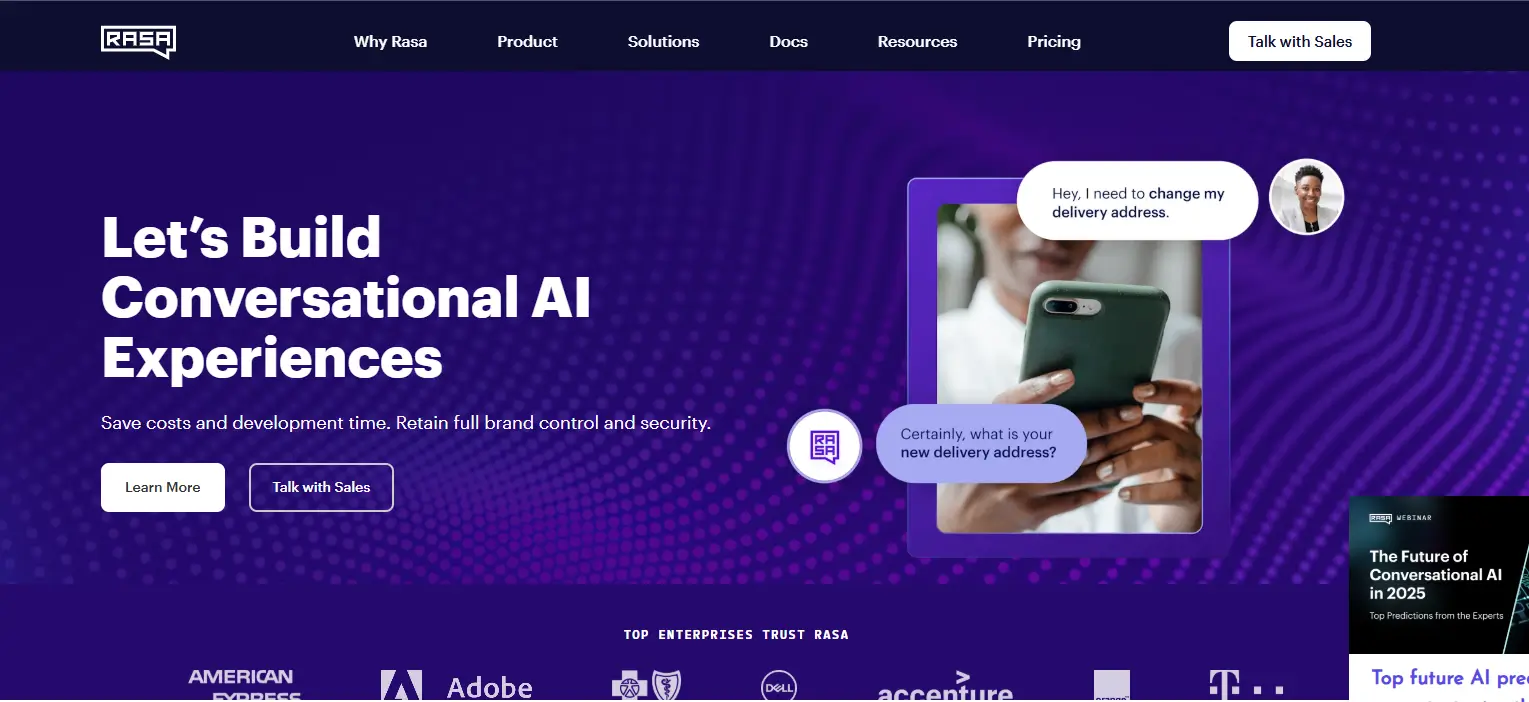
- Overview: Rasa is an open-source framework that gives enabling developers full control over conversational AI systems.
- Key Features:
- Fully customizable AI models.
- Extensive support for personalized conversational experiences.
- Strong community for enabling developers.
- Best For: Tech-savvy teams with Programming skills.
11. Haptik
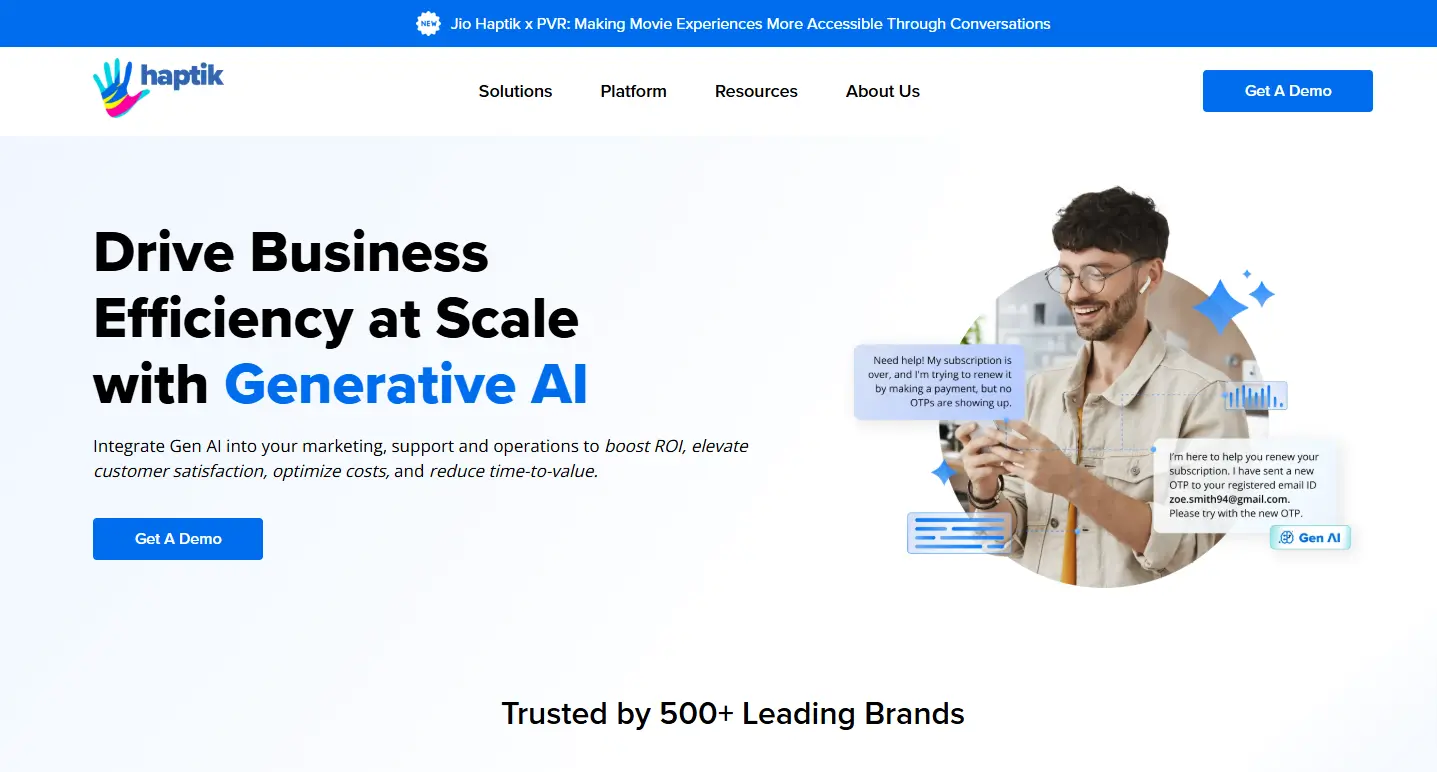
- Overview: Haptik specializes in delivering AI solutions for customer engagement and Daily chores automation.
- Key Features:
- Pre-built templates for quick deployment.
- Supports multilingual customer interactions.
- Offers insights into user behavior and feedback.
- Best For: Businesses looking for ready-to-use templates and analytics-driven optimization.
12. Aivo
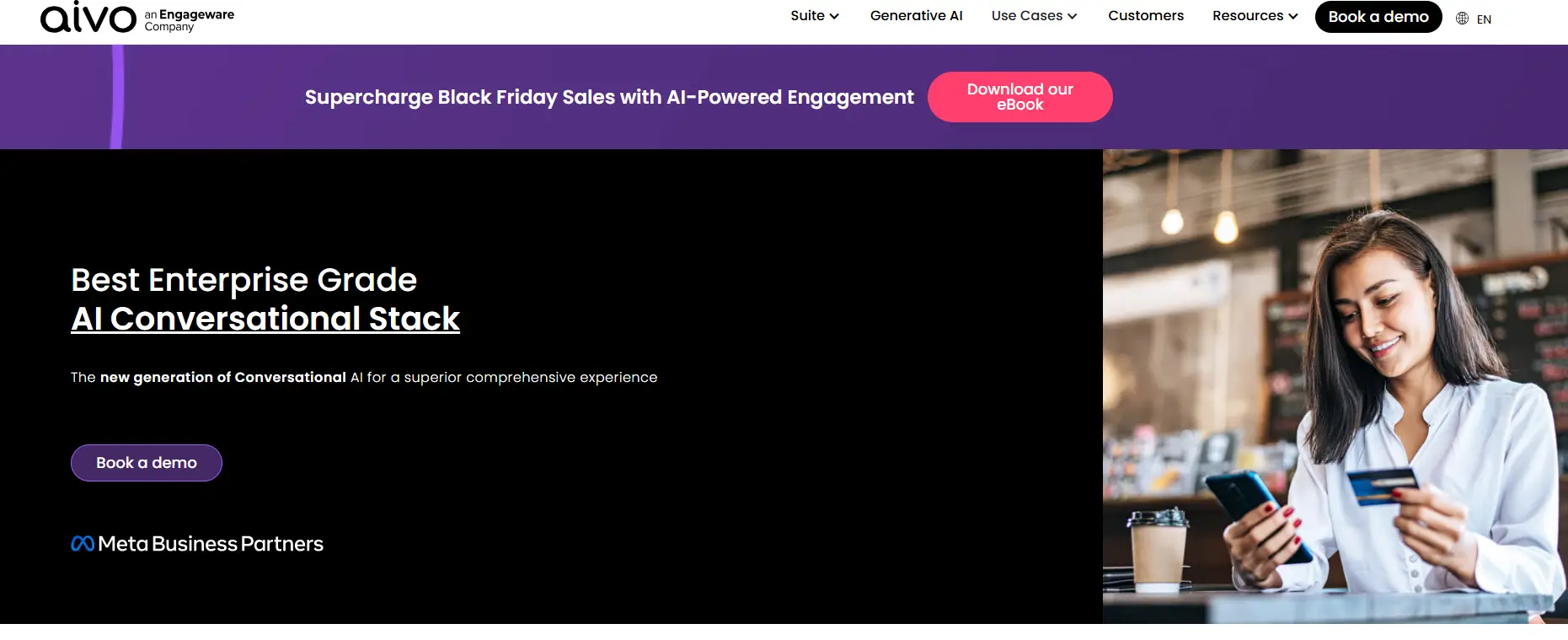
- Overview: Aivo’s AI platform is tailored for enhancing the customer experience in sales and support.
- Key Features:
- Focus on Situational awareness to deliver relevant responses.
- Integrates with popular messaging platforms.
- Strong focus on customer engagement.
- Best For: Businesses prioritizing conversational AI for sales.
13. Yellow.ai
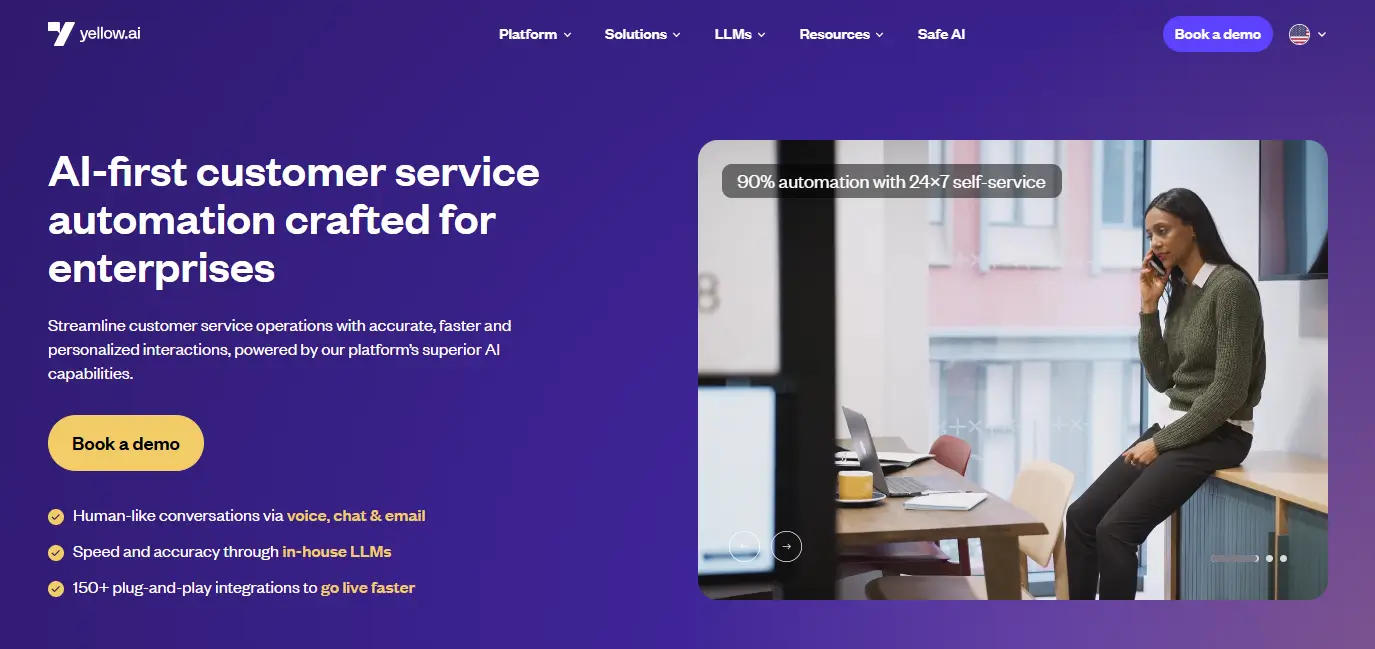
- Overview: Yellow.ai provides a flexible conversational AI platform that supports human agents and automation.
- Key Features:
- Combines generative AI capabilities with powerful analytics.
- Allows businesses to monitor and optimize conversation quality.
- Scalable solutions for enterprises.
- Best For: Large organizations looking for a hybrid AI-human solution.
Comparative Analysis of Conversational AI Platforms
Here’s a side-by-side comparison of the 13 platforms based on key features, pricing, scalability, and user feedback.
Feature Comparison
| Platform | Key Features | Best For |
|---|---|---|
| Microsoft Azure Bot | Effortless connectivity with Microsoft tools, security | Enterprises with Microsoft tech |
| Google Dialogflow | Natural Language Processing, intent matching, Google Cloud integration | Global, cloud-focused businesses |
| IBM Watson Assistant | Customizable, handles complex scenarios | Large enterprises |
| Amazon Lex | AWS integration, routine task automation | AWS-based businesses |
| Kore.ai | Industry-specific solutions, advanced bots | Specialized industries |
| SAP Conversational AI | SAP integration, multilingual support | SAP users |
| Tars | Marketing-focused, lead generation bots | Small businesses |
| LivePerson | Hybrid AI-human solutions, personalized responses | Hybrid support systems |
| Ada | Fast customer query resolution, analytics-focused | Automated support |
| Rasa | Open-source customization, developer-friendly | Tech-savvy developers |
| Haptik | Ready-to-use templates, multilingual support | Pre-built solution seekers |
| Aivo | Sales-focused, messaging platform integration | Sales-oriented companies |
| Yellow.ai | Generative AI, scalable enterprise solutions | Large-scale organizations |
Pricing Comparison
- Microsoft Azure Bot: Pricing based on usage; enterprise-friendly.
- Google Dialogflow: Free tier available; pricing varies by request volume.
- IBM Watson Assistant: Offers flexible plans; starts at $140/month.
- Amazon Lex: Pay-as-you-go pricing model.
- Kore.ai: Custom pricing tailored to industry needs.
- SAP Conversational AI: Part of SAP suite; pricing tied to overall package.
- Tars: Starts at $99/month; focused on affordability for small businesses.
- LivePerson: Custom pricing based on implementation scale.
- Ada: Transparent tiered pricing; starts at $149/month.
- Rasa: Open-source for free; enterprise features have custom pricing.
- Haptik: Pricing varies based on bot complexity and scale.
- Aivo: Offers competitive pricing for mid-sized businesses.
- Yellow.ai: Enterprise-level pricing, customized per solution
User Satisfaction Ratings
| Platform | Ease of Use | Customization | Customer Support |
|---|---|---|---|
| Microsoft Azure Bot | 8.5/10 | 9/10 | 9/10 |
| Google Dialogflow | 9/10 | 8.5/10 | 8/10 |
| IBM Watson Assistant | 8/10 | 9.5/10 | 8.5/10 |
| Amazon Lex | 8.5/10 | 8/10 | 8.5/10 |
| Kore.ai | 8/10 | 9/10 | 8.5/10 |
| SAP Conversational AI | 8/10 | 8.5/10 | 8/10 |
| Tars | 9/10 | 7.5/10 | 9/10 |
| LivePerson | 8.5/10 | 8/10 | 9/10 |
| Ada | 9/10 | 7.5/10 | 9.5/10 |
| Rasa | 7.5/10 | 9.5/10 | 7/10 |
| Haptik | 8.5/10 | 8.5/10 | 9/10 |
| Aivo | 8/10 | 8.5/10 | 8/10 |
| Yellow.ai | 9/10 | 9/10 | 9/10 |
This comparison highlights how these platforms cater to different needs, helping you choose based on customer engagement, integration, or operational efficiency.
Implementation Considerations
Choosing the right conversational AI platform is only the first step. Successful implementation requires planning, coordination, and ongoing evaluation. Here’s what to focus on:
1. Steps to Integrate a Conversational AI Platform
- Define Business Objectives: Clearly outline the goals, such as improving customer satisfaction, automating Regular duties, or enhancing customer engagement. Outline goals like automating tasks or improving customer engagement with machine learning insights.
- Select the Right Use Cases: Identify where the virtual agents will make the most impact, such as customer support, lead generation, or internal workflows.
- Collaborate Across Teams: Involve stakeholders like developers, IT professionals, and high quality customer service teams to ensure the solution meets diverse needs.
- Test the Platform: Pilot the conversational AI software to assess how well it handles Intricate situations and adapts to real-world user input.
2. Training and Change Management
Provide training on how to use and optimize the platform effectively. Emphasize key features like natural language processing, integration capabilities, and supervised learning.
- Educate Teams: Provide training on how to use and optimize the platform. Emphasize features like natural language processing and human agents escalation.
- Optimize AI Accuracy: Use data from User communications to refine the system. Leverage supervised learning to train the AI for better contextual understanding.
- Monitor Client suggestions: Continuously collect and analyze user behavior and feedback to improve response quality and Tailored replies.
3. Measuring Success and ROI
- Set KPIs: Track metrics like customer satisfaction, response quality, and operational efficiency and conversational data to refine its performance.
- Evaluate Customer Experience: Measure how well the platform improves the customer experience, focusing on areas like speed and accuracy.
- Adapt as Needed: Regularly update the platform to incorporate new AI technology and address evolving customer needs.
Implementing a conversational AI platform successfully is a dynamic process. It requires a balance of advanced technology, well-trained teams, and a clear focus on delivering value to both customers and the business.
FAQ Section
1. What is a conversational AI platform?
A conversational AI platform is a software solution that uses artificial intelligence, including natural language processing and machine learning, to create virtual agents capable of engaging in natural language conversations with users. These platforms are designed for applications like customer support, sales, and internal process automation.
2. How can a conversational AI platform improve customer experience?
By enabling personalized customer interactions and providing quick resolutions to queries, conversational AI solutions enhance the overall customer experience. These platforms improve response quality, reduce wait times, and support users across multiple channels, including chat, email, and voice.
3. Are conversational AI platforms suitable for small businesses?
Yes, several platforms, such as Tars and Ada, are tailored to small businesses. These solutions often offer affordable pricing and easy deployment, requiring minimal coding expertise. They can automate daily tasks, streamline business processes, and enhance both customer and employee experiences for better engagement across the board.
4. What industries benefit the most from conversational AI?
Industries like retail, healthcare, finance, and hospitality see significant advantages from conversational AI systems. These solutions handle complex conversations, enhance contextual understanding, and improve customer satisfaction in high-demand environments.
5. How do conversational AI platforms handle complex user queries?
Using advanced natural language understanding and context-aware conversations, these platforms analyze user intent and adapt responses dynamically. Features like automatic speech recognition and generative AI capabilities further improve their ability to address customer queries effectively.
Conclusion
The world of conversational AI platforms has evolved significantly, offering solutions that transform customer interactions and streamline business processes. Choosing the best conversational AI platform depends on your specific needs—whether it’s integrating with existing tools, automating routine tasks, or enhancing the customer experience with virtual agents. Conversational interface have revolutionized how businesses engage with customers through advanced conversational interfaces.
From enterprise-ready solutions like IBM Watson and Microsoft Azure Bot to developer-friendly platforms like Rasa, the options in 2024 cater to businesses of all sizes. The right platform will help you optimize operational efficiency, deliver personalized customer experiences, and boost customer satisfaction.
The next step is clear: evaluate your goals, test a few platforms, and implement a solution that supports your sales and marketing strategies, customer support, or internal operations. A well-chosen conversational AI platform can unlock the potential of artificial intelligence to elevate how you engage with users and drive success.
- About the Author
- Latest Posts
Gaurav Nagani was the Founder of Desku, an AI-powered customer service software platform.
- Email Management: Best Strategies, Tools & Tips for SaaS and Ecommerce
- Shared Inbox Guide: Definition, Benefits, Tools & Best Practices 2025
- LivePerson Pricing Exposed: What They Don’t Show You on Their Website
- Automate Customer Support with AI A Practical Guide
- Desku vs UsePylon: Which One Scales Better for Startups?


